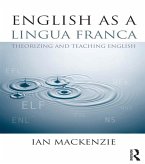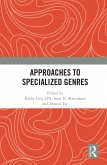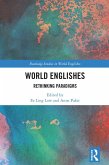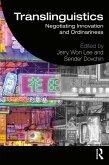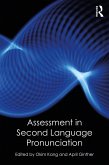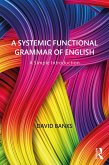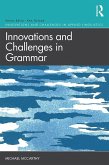Specialised English (eBook, PDF)
New Directions in ESP and EAP Research and Practice
Redaktion: Hyland, Ken; Wong, Lillian L C
42,95 €
42,95 €
inkl. MwSt.
Sofort per Download lieferbar

21 °P sammeln
42,95 €
Als Download kaufen

42,95 €
inkl. MwSt.
Sofort per Download lieferbar

21 °P sammeln
Jetzt verschenken
Alle Infos zum eBook verschenken
42,95 €
inkl. MwSt.
Sofort per Download lieferbar
Alle Infos zum eBook verschenken

21 °P sammeln
Specialised English (eBook, PDF)
New Directions in ESP and EAP Research and Practice
Redaktion: Hyland, Ken; Wong, Lillian L C
- Format: PDF
- Merkliste
- Auf die Merkliste
- Bewerten Bewerten
- Teilen
- Produkt teilen
- Produkterinnerung
- Produkterinnerung

Bitte loggen Sie sich zunächst in Ihr Kundenkonto ein oder registrieren Sie sich bei
bücher.de, um das eBook-Abo tolino select nutzen zu können.
Hier können Sie sich einloggen
Hier können Sie sich einloggen
Sie sind bereits eingeloggt. Klicken Sie auf 2. tolino select Abo, um fortzufahren.

Bitte loggen Sie sich zunächst in Ihr Kundenkonto ein oder registrieren Sie sich bei bücher.de, um das eBook-Abo tolino select nutzen zu können.
This book provides an authoritative and cutting-edge account of the latest avenues of research and practice in the dynamic field of Specialised English.
- Geräte: PC
- mit Kopierschutz
- eBook Hilfe
- Größe: 6.84MB
Andere Kunden interessierten sich auch für
![English as a Lingua Franca (eBook, PDF) English as a Lingua Franca (eBook, PDF)]() Ian MackenzieEnglish as a Lingua Franca (eBook, PDF)51,95 €
Ian MackenzieEnglish as a Lingua Franca (eBook, PDF)51,95 €![Approaches to Specialized Genres (eBook, PDF) Approaches to Specialized Genres (eBook, PDF)]() Approaches to Specialized Genres (eBook, PDF)42,95 €
Approaches to Specialized Genres (eBook, PDF)42,95 €![World Englishes (eBook, PDF) World Englishes (eBook, PDF)]() World Englishes (eBook, PDF)42,95 €
World Englishes (eBook, PDF)42,95 €![Translinguistics (eBook, PDF) Translinguistics (eBook, PDF)]() Translinguistics (eBook, PDF)46,95 €
Translinguistics (eBook, PDF)46,95 €![Assessment in Second Language Pronunciation (eBook, PDF) Assessment in Second Language Pronunciation (eBook, PDF)]() Assessment in Second Language Pronunciation (eBook, PDF)39,95 €
Assessment in Second Language Pronunciation (eBook, PDF)39,95 €![A Systemic Functional Grammar of English (eBook, PDF) A Systemic Functional Grammar of English (eBook, PDF)]() David BanksA Systemic Functional Grammar of English (eBook, PDF)37,95 €
David BanksA Systemic Functional Grammar of English (eBook, PDF)37,95 €![Innovations and Challenges in Grammar (eBook, PDF) Innovations and Challenges in Grammar (eBook, PDF)]() Michael MccarthyInnovations and Challenges in Grammar (eBook, PDF)39,95 €
Michael MccarthyInnovations and Challenges in Grammar (eBook, PDF)39,95 €-
-
-
This book provides an authoritative and cutting-edge account of the latest avenues of research and practice in the dynamic field of Specialised English.
Dieser Download kann aus rechtlichen Gründen nur mit Rechnungsadresse in A, B, BG, CY, CZ, D, DK, EW, E, FIN, F, GR, HR, H, IRL, I, LT, L, LR, M, NL, PL, P, R, S, SLO, SK ausgeliefert werden.
Produktdetails
- Produktdetails
- Verlag: Taylor & Francis eBooks
- Seitenzahl: 274
- Erscheinungstermin: 28. März 2019
- Englisch
- ISBN-13: 9780429959844
- Artikelnr.: 56139531
- Verlag: Taylor & Francis eBooks
- Seitenzahl: 274
- Erscheinungstermin: 28. März 2019
- Englisch
- ISBN-13: 9780429959844
- Artikelnr.: 56139531
- Herstellerkennzeichnung Die Herstellerinformationen sind derzeit nicht verfügbar.
Ken Hyland is Professor of Applied Linguistics in Education at the University of East Anglia. He is a Foundation Fellow of the Hong Kong Academy of the Humanities and an Honorary Professor at Warwick University, Jilin University and Hong Kong University. Lillian L. C. Wong is a Senior Lecturer in the Centre for Applied English Studies at the University of Hong Kong. She researches innovation and change in English language education, EAP and ESP, and has extensive experience developing, teaching and coordinating undergraduate, postgraduate and teacher education programmes.
Preface Brian Paltridge
Introduction Ken Hyland and Lillian L. C. Wong
Section one: Conceptual issues in specialised language use
1. Academically speaking: English as the Lingua Franca Anna Mauranen
2. What do we mean by 'Workplace English'? A syllabus framework for course
design and assessment Jane Lockwood
3.Genre as interdiscursive performance in English for Professional
Communication Vijay K. Bhatia
4. Power in English for Academic Purposes John Flowerdew
5. EAP practitioner identity Alex Ding
Section two: Focus on texts
6. English as a Lingua Franca and Learner English in Disciplinary Writing:
A corpus perspective Lynne Flowerdew
7. Academic interaction: Where's it all going? Ken Hyland
8. Exploring critical thinking in academic and professional writing: A
genre-based approach Ian Bruce
9. Vocabulary in university tutorials and laboratories: Corpora and word
lists Averil Coxhead and Thi Ngoc Yen Dang
10. Researching the impact of 'the culture order' in professional workplace
contexts Janet Holmes
11. Multimodal student texts: Implications for ESP Jean Parkinson
Section three: Focus on practice
12. Grappling with the personal statement: Transformation, appropriation,
and externalization Ann M. Johns
13. Tools and strategies for Data-Driven Learning (DDL) in the EAP writing
classroom Laurence Anthony
14. Implementing disciplinary data-driven learning for postgraduate thesis
writing LillianL. C. Wong
15. Academic writing feedback: Collaboration between subject and EAP
specialists Jill Northcott
16. Directives in academic writing tutorials: How do different teaching
styles affect their use? Ursula Wingate and Eva Ogiermann
17. Seeking supervisor collaboration in a School of Sciences at a Chinese
university Yongyan Li and Margaret Cargill
Index
Introduction Ken Hyland and Lillian L. C. Wong
Section one: Conceptual issues in specialised language use
1. Academically speaking: English as the Lingua Franca Anna Mauranen
2. What do we mean by 'Workplace English'? A syllabus framework for course
design and assessment Jane Lockwood
3.Genre as interdiscursive performance in English for Professional
Communication Vijay K. Bhatia
4. Power in English for Academic Purposes John Flowerdew
5. EAP practitioner identity Alex Ding
Section two: Focus on texts
6. English as a Lingua Franca and Learner English in Disciplinary Writing:
A corpus perspective Lynne Flowerdew
7. Academic interaction: Where's it all going? Ken Hyland
8. Exploring critical thinking in academic and professional writing: A
genre-based approach Ian Bruce
9. Vocabulary in university tutorials and laboratories: Corpora and word
lists Averil Coxhead and Thi Ngoc Yen Dang
10. Researching the impact of 'the culture order' in professional workplace
contexts Janet Holmes
11. Multimodal student texts: Implications for ESP Jean Parkinson
Section three: Focus on practice
12. Grappling with the personal statement: Transformation, appropriation,
and externalization Ann M. Johns
13. Tools and strategies for Data-Driven Learning (DDL) in the EAP writing
classroom Laurence Anthony
14. Implementing disciplinary data-driven learning for postgraduate thesis
writing LillianL. C. Wong
15. Academic writing feedback: Collaboration between subject and EAP
specialists Jill Northcott
16. Directives in academic writing tutorials: How do different teaching
styles affect their use? Ursula Wingate and Eva Ogiermann
17. Seeking supervisor collaboration in a School of Sciences at a Chinese
university Yongyan Li and Margaret Cargill
Index
Preface Brian Paltridge
Introduction Ken Hyland and Lillian L. C. Wong
Section one: Conceptual issues in specialised language use
1. Academically speaking: English as the Lingua Franca Anna Mauranen
2. What do we mean by 'Workplace English'? A syllabus framework for course
design and assessment Jane Lockwood
3.Genre as interdiscursive performance in English for Professional
Communication Vijay K. Bhatia
4. Power in English for Academic Purposes John Flowerdew
5. EAP practitioner identity Alex Ding
Section two: Focus on texts
6. English as a Lingua Franca and Learner English in Disciplinary Writing:
A corpus perspective Lynne Flowerdew
7. Academic interaction: Where's it all going? Ken Hyland
8. Exploring critical thinking in academic and professional writing: A
genre-based approach Ian Bruce
9. Vocabulary in university tutorials and laboratories: Corpora and word
lists Averil Coxhead and Thi Ngoc Yen Dang
10. Researching the impact of 'the culture order' in professional workplace
contexts Janet Holmes
11. Multimodal student texts: Implications for ESP Jean Parkinson
Section three: Focus on practice
12. Grappling with the personal statement: Transformation, appropriation,
and externalization Ann M. Johns
13. Tools and strategies for Data-Driven Learning (DDL) in the EAP writing
classroom Laurence Anthony
14. Implementing disciplinary data-driven learning for postgraduate thesis
writing LillianL. C. Wong
15. Academic writing feedback: Collaboration between subject and EAP
specialists Jill Northcott
16. Directives in academic writing tutorials: How do different teaching
styles affect their use? Ursula Wingate and Eva Ogiermann
17. Seeking supervisor collaboration in a School of Sciences at a Chinese
university Yongyan Li and Margaret Cargill
Index
Introduction Ken Hyland and Lillian L. C. Wong
Section one: Conceptual issues in specialised language use
1. Academically speaking: English as the Lingua Franca Anna Mauranen
2. What do we mean by 'Workplace English'? A syllabus framework for course
design and assessment Jane Lockwood
3.Genre as interdiscursive performance in English for Professional
Communication Vijay K. Bhatia
4. Power in English for Academic Purposes John Flowerdew
5. EAP practitioner identity Alex Ding
Section two: Focus on texts
6. English as a Lingua Franca and Learner English in Disciplinary Writing:
A corpus perspective Lynne Flowerdew
7. Academic interaction: Where's it all going? Ken Hyland
8. Exploring critical thinking in academic and professional writing: A
genre-based approach Ian Bruce
9. Vocabulary in university tutorials and laboratories: Corpora and word
lists Averil Coxhead and Thi Ngoc Yen Dang
10. Researching the impact of 'the culture order' in professional workplace
contexts Janet Holmes
11. Multimodal student texts: Implications for ESP Jean Parkinson
Section three: Focus on practice
12. Grappling with the personal statement: Transformation, appropriation,
and externalization Ann M. Johns
13. Tools and strategies for Data-Driven Learning (DDL) in the EAP writing
classroom Laurence Anthony
14. Implementing disciplinary data-driven learning for postgraduate thesis
writing LillianL. C. Wong
15. Academic writing feedback: Collaboration between subject and EAP
specialists Jill Northcott
16. Directives in academic writing tutorials: How do different teaching
styles affect their use? Ursula Wingate and Eva Ogiermann
17. Seeking supervisor collaboration in a School of Sciences at a Chinese
university Yongyan Li and Margaret Cargill
Index

